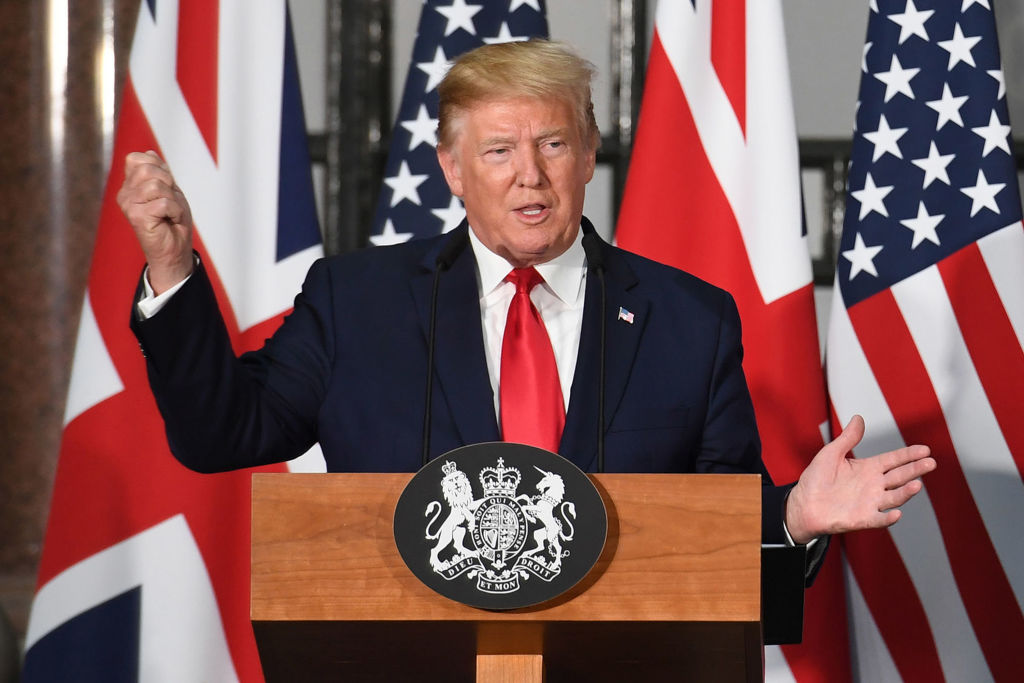“Everything with a trade deal is on the table…so NHS or anything else, a lot more than that”.
That was Donald Trump talking about a possible UK-US trade deal after Britain leaves the EU’s common trade policy. Cue political drama, headlines and Conservative leadership contenders trying to work out what to say when someone asks them if they would be willing to include NHS procurement in any future trade talks. (Not for the first time, Matt Hancock was first off the blocks, tweeting to rule it out.)
There will doubtless be a great deal of good analysis of what this comment means for the Tory leadership race: does it harm Boris Johnson, whom Trump has previously endorsed?
I have nothing to say on that. I’m more interested in the wider and possibly more important point, which is about Britain’s public conversation about trade. And here, I think Donald Trump has just done Britain a favour.
Trade has become central to the Brexit story, yet is understood very poorly.
Far too much of our trade debate talks about largely irrelevant things like personal relationships between leaders, and ignores fundamental issues of national economic interest. Put another way: countries don’t do trade deals because politicians like (or dislike) each other.
Another thing we largely overlook: the EU is a trade deal, the biggest, deepest one the world has ever seen. And trade deals mean compromises: the more access I give you to my markets, the greater the say I want over the shared rules that will govern the production and exchange of the products that will be traded.
Who compromises most in such cases? Generally, size matters: big trading economies are usually in a position to dictate terms to smaller partners. In the words of professor Dennis Novy of the University of Warwick:
“This whole trade policy world is a game of bullying. The largest guy is the biggest bully and typically gets their way.”
And the US is still, just about, the biggest bully in world trade. If you want to know more about what that looks like in detail, have a read of the US Trade Representative’s outline of negotiating objectives for any trade deal with the US.
You will find that document is rather light on references to the “Special Relationship”, our “shared history” and all the other nice words that politicians like to use about UK-US relations. It is heavy with demands and conditions, things that the US would seek to impose on Britain in exchange for making is easier for some British firms to sell some things in the US.
That document, incidentally, suggests that the US probably wouldn’t be that interested in the NHS itself: contracts to administer and run NHS services are relatively small beer. Much more attractive from a US corporate perspective is the NHS drug budget; some US pharma firms believe NHS rules unfairly exclude their products from purchase by NHS bodies. That’s probably why the USTR objectives paper doesn’t mention health services, but does mention “Procedural Fairness for Pharmaceuticals and Medical Devices” and promises to “seek standards to ensure that government regulatory reimbursement regimes are transparent, provide procedural fairness, are nondiscriminatory, and provide full market access for U.S. products.”
The harsh facts of trade are generally overlooked in British debate about trade, where the idea of Britannia ruling the waves still often prevails. Listen only to a certain sort of Brexiteer and you’d easily conclude that as soon as we’re free of that dreadful free trade deal we have with those pesky Europeans, the rest of the world will simply queue up to trade with us on preferential terms because, well, we’re great.
The awkward truth – that trade deals are long and slow and hard and involve uncomfortable compromises – generally doesn’t feature in Brexit-based conversations about trade.
None of this is to say that free trade deals are bad or undesirable: trade is good and makes the world richer and safer. But free trade ain’t free: if you want a deal, you’re going to have give things up, including possibly some things you hold very dear indeed. Sooner or later, Brexit Britain was always going to collide with that painful reality.
By setting out, plainly and simply, the truth about trade, Donald Trump has done Britain a favour.







Comments